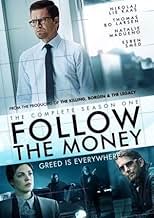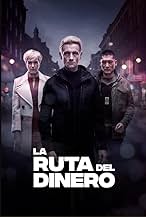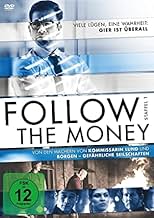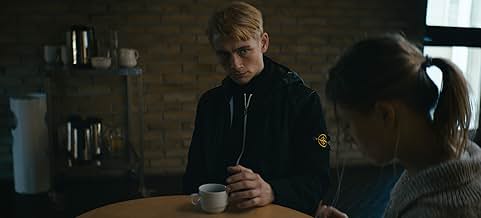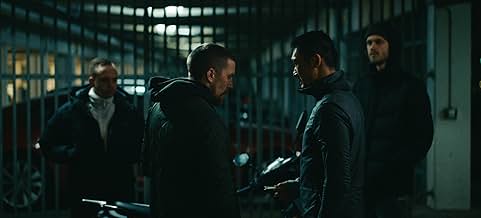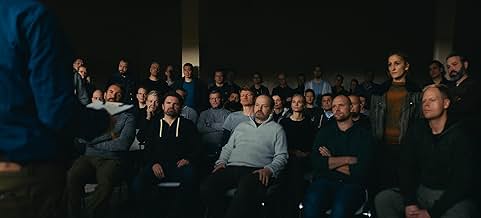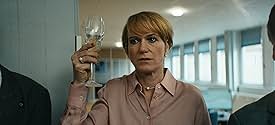Une grande entreprise danoise d'énergie durable connait une croissance énorme et suspecte. Les problèmes commencent lorsque le corps d'un employé est retrouvé et que le détective Justesen co... Tout lireUne grande entreprise danoise d'énergie durable connait une croissance énorme et suspecte. Les problèmes commencent lorsque le corps d'un employé est retrouvé et que le détective Justesen commence à enquêter sur Energreen.Une grande entreprise danoise d'énergie durable connait une croissance énorme et suspecte. Les problèmes commencent lorsque le corps d'un employé est retrouvé et que le détective Justesen commence à enquêter sur Energreen.
- Récompenses
- 6 victoires et 10 nominations au total
Parcourir les épisodes
Avis à la une
This decade has brought along so many strong Scandinavian dramas that it is often difficult to keep track and make distinctions - partially also due to the limited number of performers filling out major/important roles... The same applies to Bedrag, where modern "coryphaeuses" like Nikolaj Lie Kaas as Alexander Sødergren and Thomas Bo Larsen as Mads take part, but many smaller roles are also performed by many otherwise having bigger roles in famous series. Still, the two mentioned are not dominating too much, every character has its significance, and all in all, a solid cast is formed, to be widely followed and noticed.
True, a good series emanates from the plot, and it is pleasantly versatile; focusing on e.g. financial crimes only would have made the plot more arid and specific, not for wider audience, but inclusion of a punisher and petty thieves has provided thrilling and even some amusing moments, enabling to "freshen up" from sophisticated economic relations and terms. The ending is also many-featured, probably not satisfactory per se, but evidently more realistic as not all wrongdoers are caught and/or sentenced in real world.
Although the Season 1 had its somewhat clear - but not full-scale - end, I have read that Season 2 will follow. Good news, I will definitely watch it as well.
True, a good series emanates from the plot, and it is pleasantly versatile; focusing on e.g. financial crimes only would have made the plot more arid and specific, not for wider audience, but inclusion of a punisher and petty thieves has provided thrilling and even some amusing moments, enabling to "freshen up" from sophisticated economic relations and terms. The ending is also many-featured, probably not satisfactory per se, but evidently more realistic as not all wrongdoers are caught and/or sentenced in real world.
Although the Season 1 had its somewhat clear - but not full-scale - end, I have read that Season 2 will follow. Good news, I will definitely watch it as well.
I thoroughly enjoyed the first two seasons but season three is where I really sat up and paid attention. I love the characters in #3 ... Anna played by Maria Rich with her uncoordinated awkwardness in particular fascinates me as she slides comfortably into a life of crime away from her husband's stultifying presence.
Thank you Denmark for constantly restoring my faith in television drama! :)
Thank you Denmark for constantly restoring my faith in television drama! :)
Strong Danish drama 'Follow the Money' proves you don't have to centre a story on murder (not that there aren't some of those) to have a strong detective drama. The Scandinavian realist approach will be familiar to viewers of 'The Killing' or recent Icelandic drama 'Trapped'; but there's less emphasis on mood-building, and more direct focus on the story (in the manner of 'Borgen'). Ultimately, it's almost an impossible task to make a drama out of a fraud, and bits of the series seem a little too simplistic to make sense, in spite of the intricacy of the plotting; likewise, one sympathises vaguely with the characters without caring too deeply. But the pace is nicely judged, and it makes for addictive viewing.
Another very watchable series, though not quite on par with Borgen. The characters are a bit lop-sided in terms of believability, but the acting is generally very good with a few excellent main characters.
The storyline sometimes gets sidetracked and a bit absurd, but this is fiction and enjoyable entertainment. It may not be the usual fast-paced show that is geared towards a juvenile mind, but it is well done and the dialogue is mature and believable on the whole.
Scandinavian drama is a great alternative and companion to the many excellent British police/investigative and serious dramas we love to watch.
The storyline sometimes gets sidetracked and a bit absurd, but this is fiction and enjoyable entertainment. It may not be the usual fast-paced show that is geared towards a juvenile mind, but it is well done and the dialogue is mature and believable on the whole.
Scandinavian drama is a great alternative and companion to the many excellent British police/investigative and serious dramas we love to watch.
The opening credits set forth the theme of Jeppe Gjervig Gram, Jannik Tai Mosholt, and Anders Frithiof August's thriller. The protagonists are photographed in washed-out colors, in front of a filter showing water rising slowly from the bottom to the top of the frame. This suggests that they are somehow drowning; not physically drowning, perhaps, but unable to cope with a world riddled with corruption.
This image is reinforced during the ten-part thriller through a tripartite plot. The chief executive of a Danish energy firm, Energreen (Nikolaj Lie Kaas) has ambitions to monopolize the market and is prepared to go to any lengths to achieve his aims - murder, corruption, manipulation. He enlists the services of idealistic lawyer Claudia (Natalie Madueño), and leads her on a series of increasingly violent adventures across Europe - Copenhagen, London, Paris, Rome. Deputed to investigate the case, police officer Mads (Thomas Bo Larsen) has his own domestic problems, as his wife Kristina (Line Kruse) dumps him for a doctor. The third plot focuses on car mechanic Nicky (Esben Smed Jensen) who finds a bag full of loot belonging to Energreen and tries his best to profit as a result, even if that results in blackmail.
The plot twists and turns throughout the ten episodes, providing sufficient cliff-hangers for viewers to continue watching. In truth, however, its pace is often painfully slow; little attention has been paid to either character-development or examining how the claustrophobic environment of the urban office can often restrict people's emotions, as well as their behavior. As a result the plot often seems rather contrived: each episode has to have its hook at the end, but frequently viewers see what that hook is going to be, even before the episode has concluded.
The series does possess its saving graces, including atmospheric cinematography from a variety of camera people, creating a gray world in which very little happiness seems to exist, other than the happiness provided by money. It seems that capitalist values have been left to flourish unrestricted, with the result that everyone, from the highest to the lowest social classes, is out to profit at others' expense. A profoundly depressing view of Western European life, to be sure.
This image is reinforced during the ten-part thriller through a tripartite plot. The chief executive of a Danish energy firm, Energreen (Nikolaj Lie Kaas) has ambitions to monopolize the market and is prepared to go to any lengths to achieve his aims - murder, corruption, manipulation. He enlists the services of idealistic lawyer Claudia (Natalie Madueño), and leads her on a series of increasingly violent adventures across Europe - Copenhagen, London, Paris, Rome. Deputed to investigate the case, police officer Mads (Thomas Bo Larsen) has his own domestic problems, as his wife Kristina (Line Kruse) dumps him for a doctor. The third plot focuses on car mechanic Nicky (Esben Smed Jensen) who finds a bag full of loot belonging to Energreen and tries his best to profit as a result, even if that results in blackmail.
The plot twists and turns throughout the ten episodes, providing sufficient cliff-hangers for viewers to continue watching. In truth, however, its pace is often painfully slow; little attention has been paid to either character-development or examining how the claustrophobic environment of the urban office can often restrict people's emotions, as well as their behavior. As a result the plot often seems rather contrived: each episode has to have its hook at the end, but frequently viewers see what that hook is going to be, even before the episode has concluded.
The series does possess its saving graces, including atmospheric cinematography from a variety of camera people, creating a gray world in which very little happiness seems to exist, other than the happiness provided by money. It seems that capitalist values have been left to flourish unrestricted, with the result that everyone, from the highest to the lowest social classes, is out to profit at others' expense. A profoundly depressing view of Western European life, to be sure.
Le saviez-vous
- AnecdotesThe original Danish title, 'Bedrag.' literally means 'Deception,' but was titled 'Follow the Money' for English-language audiences.
Meilleurs choix
Connectez-vous pour évaluer et suivre la liste de favoris afin de recevoir des recommandations personnalisées
Détails
Contribuer à cette page
Suggérer une modification ou ajouter du contenu manquant


